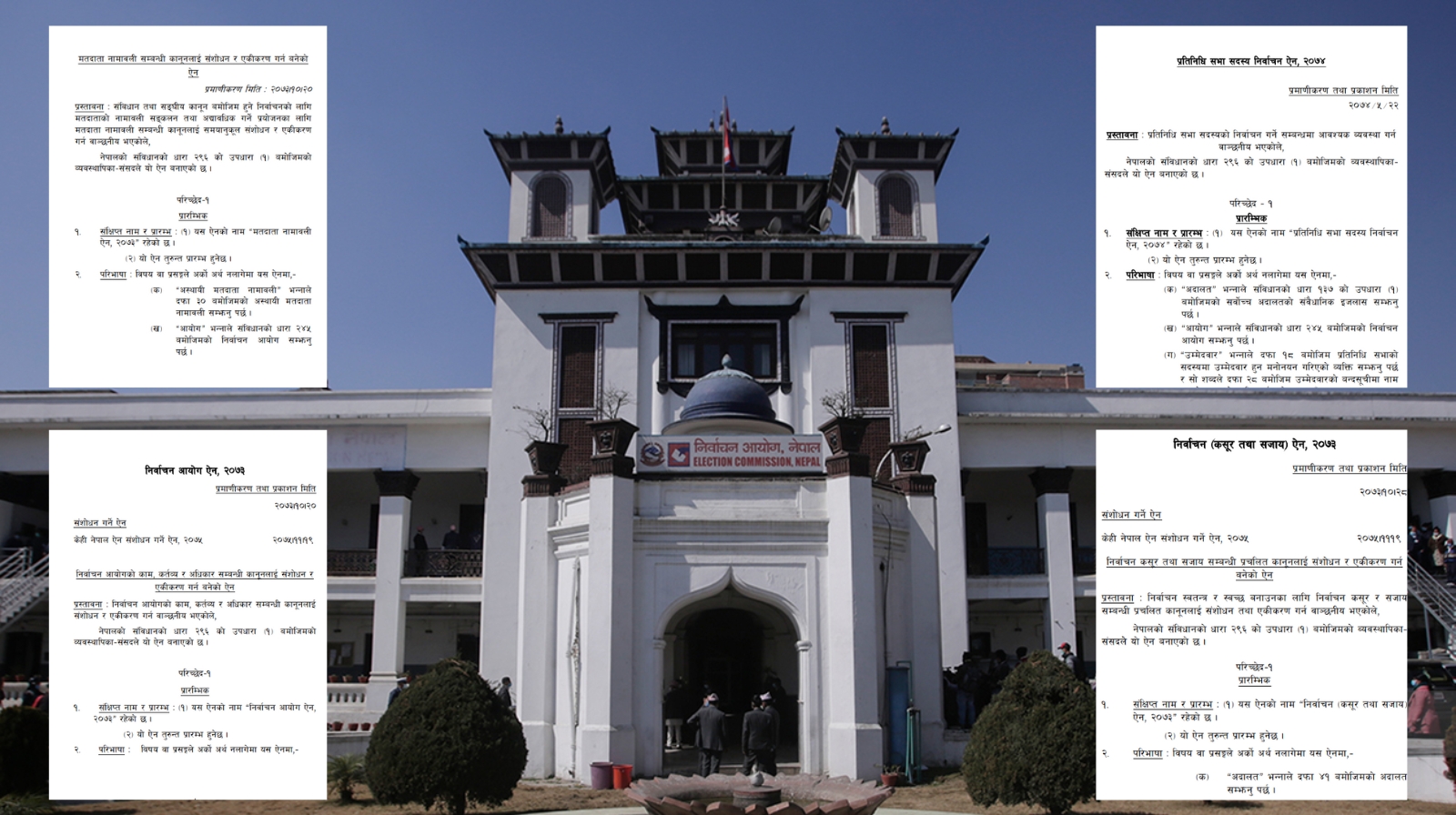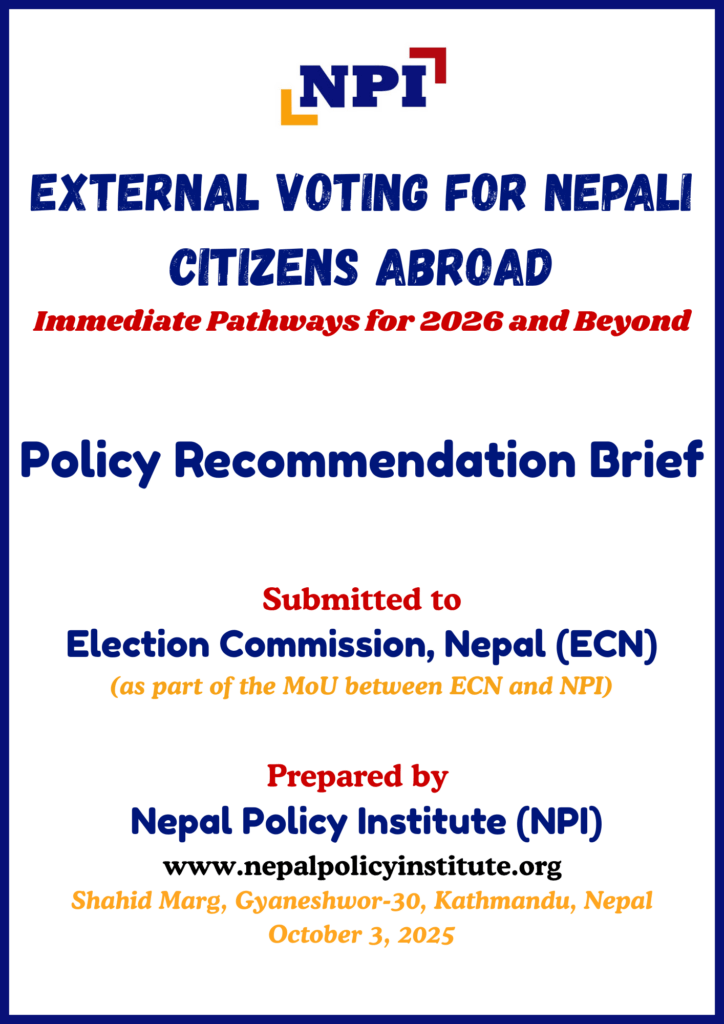
Voting Rights also demand crucial improvements in management and technology to succeed

KATHMANDU: With the government’s announcement to hold the House of Representatives election on March 5, the Election Commission (EC) has geared up for preparations. The issue of voting rights for Nepali citizens residing abroad is being raised in the election. Discussions about securing the political rights of non-resident Nepalis have been ongoing since the past. On one hand, the citizen’s right to participate in voting, and on the other, the demand to grant voting rights to non-resident Nepalis in honor of their contribution to the country’s economy, have been persistently raised.
Now, the pressure to include Nepalis abroad in voting is particularly intense in the changed context following the Gen Z movement. Non-resident citizens, who form a strong basis for the national economy by sending remittances from abroad, have been demanding that their participation in elections, a crucial part of the state governance process, be ensured.
The issue of voting rights for Nepalis abroad was also raised during the first Constituent Assembly election in 2008. On March 21, 2018, the Supreme Court ordered that Nepalis residing abroad be granted the right to vote and directed the government to arrange the necessary laws and infrastructure for this. However, the Supreme Court’s order was not implemented in the elections held for all three tiers of government in 2022.
One of the demands of the Gen Z movement was the assurance of voting rights for those abroad. Home Minister Om Prakash Aryal of the government formed on the strength of this movement has been stating that the voting rights of Nepalis residing abroad will be established. Similarly, Prime Minister Sushila Karki, in her address to the nation, has also stated that discussions are underway regarding the participation of Nepalis abroad in voting.
In the current situation, how possible is it to grant voting rights to non-resident Nepalis? Are the current legal, managerial, and technical aspects favorable for this?
Minister of Communication and Information Technology Jagdish Kharel, who is also the government spokesperson, states that discussions are ongoing from legal, technical, political, and other perspectives in coordination with the Election Commission to ensure the voting rights of Nepalis residing abroad. He says that the government is preparing to amend the law to grant voting rights to non-resident Nepalis in this very election. He says, “This issue is no longer just the government’s; it involves political parties, the Election Commission, and all other stakeholders. We have started dialogue with the political parties.”
Khagendra Raj Dhakal, coordinator of the Nepal Policy Institute (NPI), argues that the millions of Nepali citizens abroad for employment and study should not be deprived of the right to vote. Stating that their voting rights can be ensured immediately, he says, “It would be appropriate to prepare separate legal provisions for voting and give legal validity to voting through digital voter registration and e-voting in the proportional representation system.”

The Election Commission has instructed that the remaining work of voter registration and update for the March 5 election must be completed by November 16. The Commission has stated that voter registration can only be done within Nepal. The EC has not spoken about the issue of citizens abroad.
The reason is that the existing election and related laws do not open the way for the participation of Nepalis residing abroad in the election process. Narayan Prasad Bhattarai, spokesperson for the Election Commission, says that the issue related to election law is under discussion. “The matter is under discussion; since a conclusion has not been reached, we are not in a position to say anything definitive,” he says.
To arrange voting for Nepalis abroad, some laws must be amended. Without such legal reform, their right to vote does not seem possible.
Four laws that need amendment
The Election Commission is the body that conducts elections in coordination with the government. The EC states that the issue of granting voting rights to Nepalis residing abroad is complicated due to the absence of relevant laws. The EC estimates that if arrangements are to be made for voting from abroad in this March election, the amendment of at least four laws is mandatory.
According to the EC’s Law Branch, the laws that need amendment are the Election Commission Act, 2017; the Voter Roll Act, 2017; the Election Offence and Punishment Act, 2017; and the House of Representatives Member Election Act, 2017.
According to the branch’s staff, the Election Commission Act must be amended to add a provision for deploying election officers abroad. Similarly, the House of Representatives Member Election Act must be amended to include provisions for creating, printing, and transporting proportional and direct ballot papers and specifying where and how the counting of votes will take place. The Voter Roll Act must be amended to add the subject of registering the names of adult individuals residing abroad in the voter roll. Similarly, the Election Offense and Punishment Act must be amended to clarify issues such as whether or not to allow non-resident Nepalis to participate in the voting process if they have committed any offense according to the law of the respective country.
Communication Minister Kharel says that these issues have been raised in various rounds of discussions with the EC. “Since these issues require all-party consensus, we are in continuous discussion,” he says.
What do the experts say?
The government led by Sushila Karki, which has the mandate to hold elections, must conduct the election within about four months and hand over the keys to power to the democratically elected representatives. Generally, important work related to the election intensifies about four months, or 120 days, before the election. Since time is limited, there is no apparent preparation for how the necessary work to involve Nepalis residing abroad in voting will be completed during this period. Specifically, data must be collected on how many non-resident Nepalis live in which country, and what is the exact number of eligible adult voters.
Similarly, the financial, technical, and other aspects required to establish voting rights and complete the election must be addressed through acts, policies, and laws. However, the EC is in trouble because the government has not amended the necessary laws or brought them forth through an ordinance.
An EC official states that in this situation, the issue of voting rights for Nepalis abroad is not possible just because it is being debated and discussed or because the Supreme Court issued an order. “The EC alone cannot make it happen; the government needs to make the laws and provide the resources,” he says.
Former Chief Election Commissioner Nilkantha Upreti also states that no matter how much debate there is, there will be no result until the necessary legal provisions are made to grant voting rights to Nepalis residing abroad. He says, “To grant voting rights to citizens living abroad, clear provisions must be made in the law and regulations, and accordingly, software must be developed, necessary entries must be adjusted in the voter roll, and arrangements must be made for who will vote from which country/place.”
According to experts, various measures can be adopted to involve non-resident Nepalis in the voting process by making provisions in the law. These measures include setting up polling centers in diplomatic missions abroad and conducting the vote, voting via mail, or arranging electronic or e-voting. Experts suggest that if voting is not possible under the first-past-the-post (direct) system, it could be arranged only for the proportional representation system.
Former Chief Election Commissioner Upreti suggests that if non-resident Nepalis are to participate in voting, data must first be collected on how many Nepalis are in which country and how many have renounced their citizenship. Along with this, he says administrative and technical preparations must be carried out simultaneously. However, he assesses that the Election Commission has not done enough work on these issues. He says, “Sufficient study and data collection on citizens abroad are needed, and it is also necessary to assess how many resources are required and how robust the managerial aspect is.”
The Nepal Policy Institute has concluded that Nepalis residing abroad can participate in the March election. Coordinator Dhakal says that they studied the matter and submitted a report with nine points of suggestions to the Election Commission. He says, “We have recommended that e-voting be institutionalized as the main system for the election. This will open the way to include not only those abroad but also those internally outside their constituency in the election process.”
To secure the political rights of citizens abroad, amending the law is not enough; technical preparation is also necessary. Attention must also be paid to the participation of candidates’ representatives at polling stations abroad, the security of polling centers, cooperation with the host country, and the management of necessary resources. Former Chief Election Commissioner Upreti says that the government, the Election Commission, and political parties must hold serious discussions on these issues and reach a conclusion for the upcoming election.